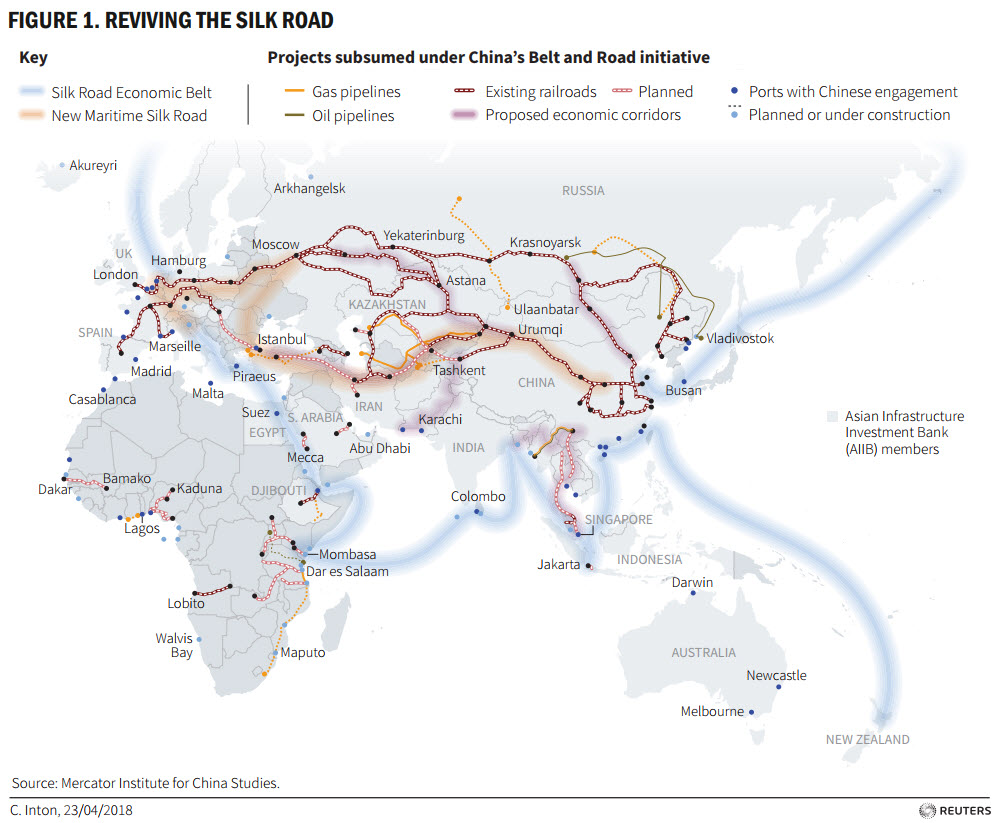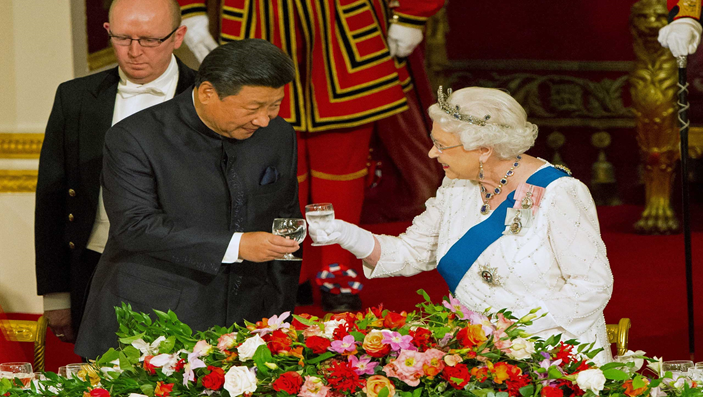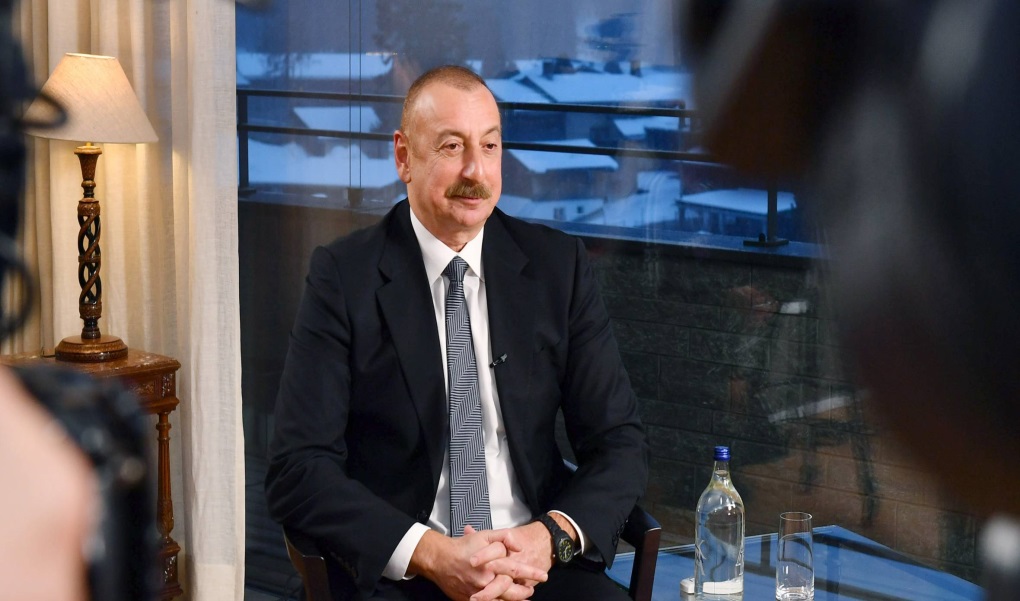Politicon.co
The General Review of Chinese Giant Project “One Belt One Road”: The Importance of Central Asia and Azerbaijan
The project of China named "One Belt, One Road", otherwise known as the "Belt and Road Initiative," can be considered the largest strategic project in the present world. In many political and economic circles, this project is compared to the Marshall Plan of the United States. The project is a modern version of the classic Silk Road mission of the ancient Chinese dynasty, which aimed to be one of the biggest economic influencers in the global world. The total cost of the project, which was officially announced by Chinese leader Xi Jinping in 2013 and will take more than 35 years, is estimated to be in the range of 4–8 trillion dollars.
Modern Silk Road project – “One Belt One Road”

Far Eastern Eurasia has historically been the geography of the world's main production resources. Europe's manufacturing machine became stronger, and the western civilization became the world's leading force in GDP production due to technological advantages of Industrial Revolution. But due to its primary raw material resources, East Asia has retained its importance. For example, the East India Company enriched English factories with raw materials from East countries.
Back in the 3rd century BC, the Chinese empire put forward the Silk Road project to horizontally connect the entire world at that time in order to increase its economic power. The goal was to sell Chinese-made products to Europe, especially silk. The importance of this project has always been focused on different poles. This project has been part of the main strategies of many empires. The Turks, who dominated the world during the Middle Ages, controlled the geography at the heart of this trade route. It was one of the main factors led Europeans to acquire the resources of the East by the other ways, and as a result great geographical discoveries took place.
China, which suddenly became a global economic and technological power in the 21st century, again raised the issue of creating this strategic path. In fact, this new road is not an ordinary caravan route but a broad macroeconomic and political strategy of China, which includes very large infrastructure projects. In 2013, Chinese leader Xi put forward an official state plan called One Belt, One Road (OBOR).
Xi Jinping with Queen Elizabeth II at a state banquet at Buckingham Palace, in London, 20 october 2015. Photo: Reuters.

The plan is a broad project with many branches. From the central line, the classic Silk Road should connect Beijing and London. Other directions aim to reach the Baltic Sea and Eastern Europe through Russia and the Indian Ocean through Pakistan from the south. This project, which will directly and most importantly affect 65 countries and 150 countries in total, will cover 62% of the world's population and 40% of its economic output [1]. According to some reports, 1 trillion dollars is needed for ports, railways, oil and gas pipelines to be built in 70 countries as the first main stage [2].
The reaction of London is important where is the last station for this mega economic route connecting the entire continent from China to Great Britain,. In 2015, Chinese President Xi's visit to England played an important role in the revival of political and economic relations between the two countries. In 2017, British Finance Minister Philip Hammond called Britain a natural partner for the new silk project and noted that the project will bring unlimited opportunities [3].
The implementation of this huge project had important issues that needed to be resolved on the political front. Along with economic investment and technological challenges, another important factor were political issues. China had to first move over the countries of the nearby region in order to build the political arm of this project from the ground up. It was no coincidence that the place where the project was announced was Kazakhstan. China was the first to strengthen ties with the largest country in Central Asia. China based its strategic plans for Central Asia on the energy sector and began to create safe economic zones. In September 2013, 22 agreements worth $30 billion were signed between China and Kazakhstan [4]. Rafis Abazov, visiting professor at Al Farabi Kazakh National University in Kazakhstan, told:
“A route from China will go to Europe via Central Asia, via Kazakhstan. It requires a lot of investment in infrastructure. According to the UN data, the quality of the infrastructure of Kazakhstan is not very good, its highways rank 170th in the world, and its seaports rank 158th in the world. From another statistical source, only 5% of the highways in Kazakhstan are class A according to international standards, while 17% of its roads are below class 3 standards. All these indicators suggest that Kazakhstan, as a developing country, needs a lot of investment into its infrastructure, including roads, railways, airports and so forth, to bring them up to international standards. Some experts estimate that the country needs up to US$100 billion of investments into infrastructure in the next few years and it needs the expertise to manage this large inflow of projects.” [5].
Chinese President Xi, who made his first foreign visit to Kazakhstan in September 2022 since the coronavirus pandemic, reached an agreement on trade with national currencies.
Uzbekistan plays a key role for China in the region. After Russia, Uzbekistan's main trade partner is China. In 2022, the economic relations between the two countries increased by 32%, and the process continues rapidly. Uzbekistan is interested in Chinese investment in his country and delivering of goods from the east to the west through the OBOR project [6]. Turkmenistan also has important transit implications for China. At the same time, the largest buyer of Turkmen gas in the world is China. China has also made big investment proposals for Turkmenistan.
The OBOR project has lost an arm due to sanctions imposed on Russia as a result of the war in Ukraine, which started in February 2022. In the emerging geopolitical situation, the importance of the Central Asian line has increased. Also, the transit importance of Azerbaijan has risen up. At the same time, Azerbaijan as an important energy producer has become a point of intersection for many global projects. The horizontal nature of the OBOR project suddenly became also a vertical priority for the north-south corridor. In 2020, Azerbaijan won a victory over Armenia in the “44-day war”, not only returned its motherlands but also becoming the main initiator of the Zangezur Corridor project which has the potential to connect the different poles.
Azerbaijan's relations with China have always developed in a positive way. Many important political and economic agreements have been signed between the countries. Remarkable were the views expressed by the President of the Republic of Azerbaijan, Ilham Aliyev, at the Davos economic forum in January 2023 about the relations with China and the OBOR project:
“So, first of all, the initiative, the “Belt and Road” Initiative, was a timely and very wise initiative that now embraces and covers a large geography. And Azerbaijan actively joined from the very beginning, and we started to invest in the infrastructure, which was not in place. So, over the last ten years, we built one of the largest, if not the largest, trade seaports in the Caspian, with a capacity of 15 million t, which we plan to expand to 25 million t. We build a shipyard to be able to manufacture the vessels to transport cargo across the Caspian. We invested largely in the railroad infrastructure, not only in Azerbaijan but also in the neighborhood. And now, we have allocated additional investments to expand the capacity of this railroad from Baku to the western destination. And we did all the necessary other projects, like highways and airports. So, Azerbaijan, a country that does not have open access to the ocean, became an international logistical and transportation center. So, the "Belt and Road" Initiative also activated transportation through different routes, particularly north-south. And now we'll also talk about the Northwest. So, it's really a global project that is moving successfully, and all the countries on the route already see the benefits.” [7].
President of the Republic of Azerbaijan Ilham Aliyev was interviewed by China's CGTN (China Global Television Network) TV channel in Davos. 17 January 2023. Photo: President.az

President Ilham Aliyev's statements demonstrate why Azerbaijan is a necessary country at strategic crossroads. This is especially true given that the main compass runs east-west as well as north-south.
The year 2023 is the 10th anniversary of China's OBOR project. In the last 3 years, the global pandemic restrictions and the war in Ukraine have caused many delays in this project. At the beginning of 2023, China announced to mitigate the pandemic rules and open the country's doors. While this is known to lead to economic recovery, the ongoing war in Ukraine has kept global tensions high. The biggest prospects of the world and which trends to follow are one of the most important topics in the political-economic world.
References:
1. Jeff Desjardins - Visualizing China’s Most Ambitious Megaproject, Visual Capitalist (2018). https://www.visualcapitalist.com/ambitious-infrastructure-megaproject/
2. Marshall W. Meyer - China’s Belt and Road Initiative: Why the Price Is Too High, Knowledge at Wharton (2019). https://knowledge.wharton.upenn.edu/article/chinas-belt-and-road-initiative-why-the-price-is-too-high/
3. Christian Nelson - UK's Hammond embraces Belt and Road on China visit, The National News, Business (2018). https://www.thenationalnews.com/business/economy/uk-s-hammond-embraces-belt-and-road-on-china-visit-1.744770
4. Reuters Staff - China, Kazakhstan to ink deals worth $30 billion on Saturday, Reuters (2013). https://www.reuters.com/article/us-kazakhstan-china-deals-idUSBRE98608320130907
5. Pansy Yau - Kazakhstan Welcomes China’s Belt and Road Initiative, Research HKTDC. https://research.hktdc.com/en/article/MzE4MTIzNjY2
6. Yunis Sharifli - Growing Importance of Uzbekistan for China, Geopolitical Monitor (2022). https://www.geopoliticalmonitor.com/growing-importance-of-uzbekistan-for-china/
7. President.az - Ilham Aliyev was interviewed by China's CGTN TV channel in Davos (2023). https://president.az/en/articles/view/58652
![]()
- TAGS :
- Azerbaijan
- China
- One Belt, One Road
- TOPICS :
- Economy
- Geopolitics
- REGIONS :
- Central Asia
